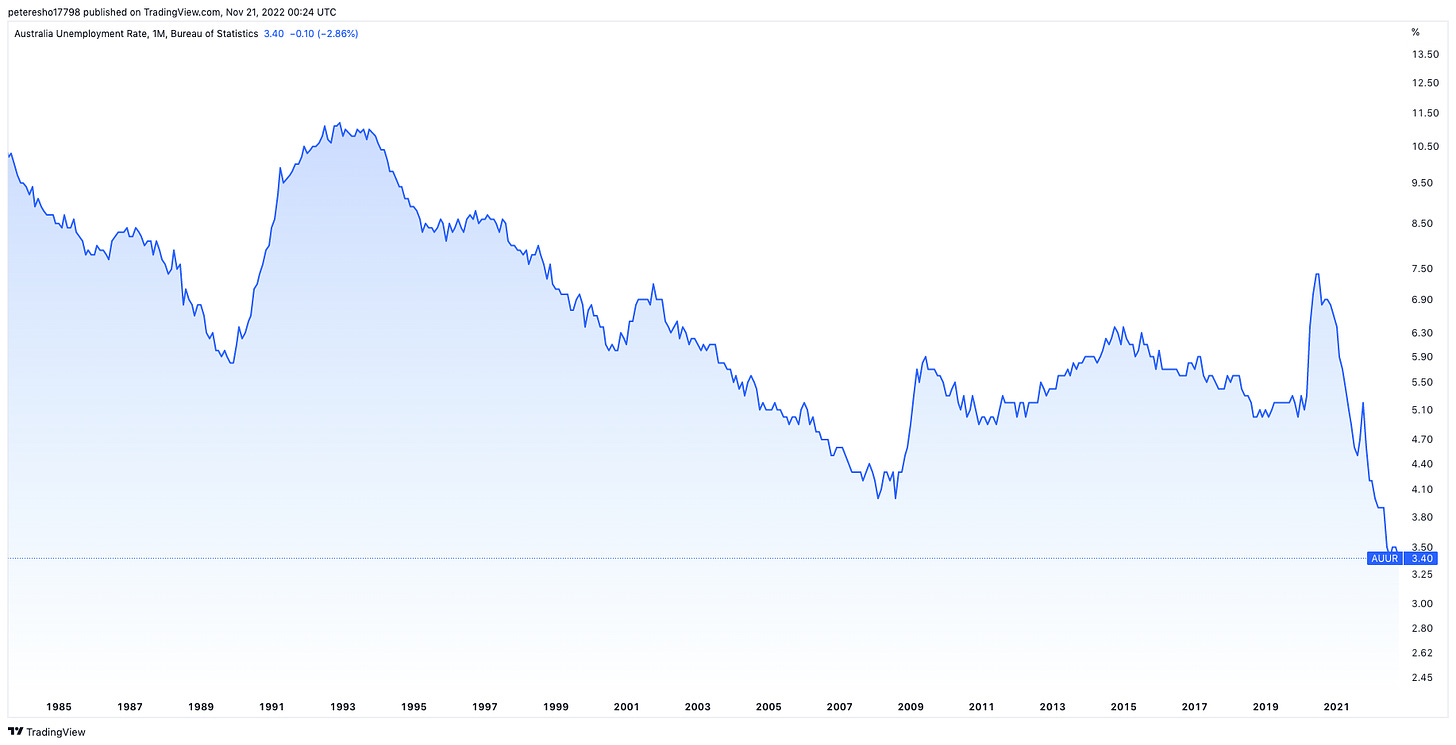Strong jobs market to drive global real estate in 2023
One of the most important drivers for any real estate market is the quality and depth of the jobs market. Employment is a critical factor to housing demand, when there is a high degree of certainty around employment opportunities, you will usually see that sentiment flow through into the housing market.
People with strong jobs are less likely to force sell their properties and more likely to expand their investment portfolio when markets soften.
The housing market is the business cycle. Both go hand in hand. Central banks around the world are raising interest rates because employment is strong, driving inflation higher. Employment is not the only driver, but it is a huge driver.
Let’s take for example the Aussie jobs report last week which showed that unemployment fell to a record low 3.4%. That number would have been unimaginable a few years ago. The chart below puts things into perspective, going back to when I was born in 1984. It’s never been this good for employees.
Australia’s unemployment rate is not the only number that matters, though the US and UK are in similarly strong positions. Europe is the outlier and Canada has a less impressive number, but generally speaking, the global economy is in a much better position than we previously thought.
My point in this note is to be careful that you don’t get caught in a negative news cycle echo chamber. If you look for negative news, you’ll find it. It’s very important to look at the data objectively and then form your view. I’ve been wrong many times. There’s nothing wrong with being wrong and changing your mind.
Legendary investor George Soros once said “…it's not whether you're right or wrong that's important, but how much money you make when you're right and how much you lose when you're wrong…"
So while some will look at interest rates and think that they will automatically destroy the housing market, we must also look at rising rates as a sign that the economy is strong and the jobs market in many economies, including Australia, is extremely robust. I wrote more about this in my note last week titled “What if the global economy is much stronger than expected”.
Most major metropolitan real estate markets have already gone through a correction in the order of about 10-15%, which is normal given such strong growth in recent years. Residential real estate is not the crypto or stock market.
The global trend is similar. A colleague of mine based in New York recently went onto Fox Business and said that the number of transactions have fallen in the upper-end market, but prices are flat. There are less transactions, but prices are not necessarily falling like they did in 2008 or the earlier 1990s.
Supply is tight, jobs are strong and there are buyers in the market willing to step in and buy on value. This will support prices.
So where do we go in 2023?
My base case has now changed from interest rates falling to interest rates remaining at current levels for a little longer. The jobs market is just too strong and even if higher rates makes life harder, I just can’t see how unemployment starts to rise quickly from these levels.
This is a good thing, not bad news. Jobs are the oxygen of every healthy economy.
Rate rises will bite, but the economy is super strong at current levels and can absorb. Wages are going to start rising perhaps quicker than expected early in 2023. People need increases to keep up and they’ll get it in strong employment markets such as Australia, US and to some extent the UK.
As a real estate investor, the game is all about income growth. You need to be thinking about income growth over the next 5 to 10 years. Small is beautiful, particularly in well located markets.
We need to start being used to 4-5% interest rates and properties generating 5-6% yields again. That will come from strong rental growth over the next few years. Rising rates will ultimately slow things down, it’s just not going to happen overnight.
Residential real estate is an excellent hedge in a rising inflation environment because rents tend to rise when jobs are strong.





